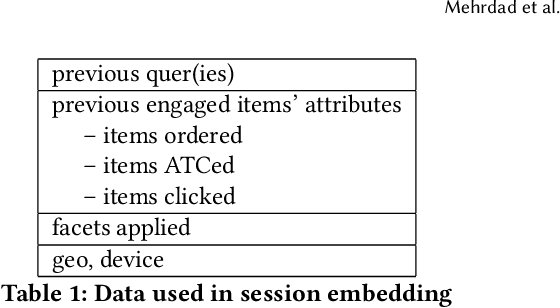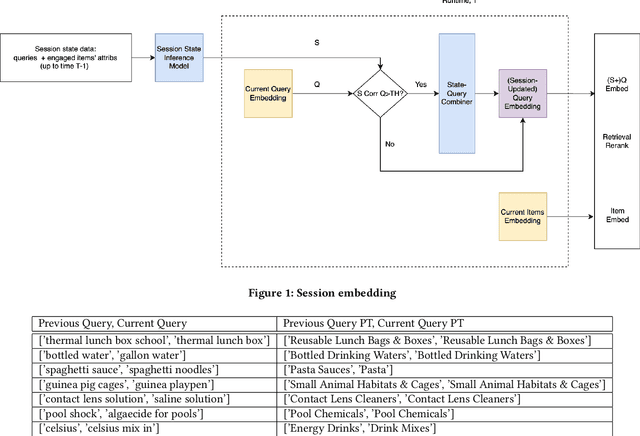Navid Mehrdad
Session Context Embedding for Intent Understanding in Product Search
Jun 03, 2024



Abstract:It is often noted that single query-item pair relevance training in search does not capture the customer intent. User intent can be better deduced from a series of engagements (Clicks, ATCs, Orders) in a given search session. We propose a novel method for vectorizing session context for capturing and utilizing context in retrieval and rerank. In the runtime, session embedding is an alternative to query embedding, saved and updated after each request in the session, it can be used for retrieval and ranking. We outline session embedding's solution to session-based intent understanding and its architecture, the background to this line of thought in search and recommendation, detail the methodologies implemented, and finally present the results of an implementation of session embedding for query product type classification. We demonstrate improvements over strategies ignoring session context in the runtime for user intent understanding.
Large Language Models for Relevance Judgment in Product Search
Jun 01, 2024Abstract:High relevance of retrieved and re-ranked items to the search query is the cornerstone of successful product search, yet measuring relevance of items to queries is one of the most challenging tasks in product information retrieval, and quality of product search is highly influenced by the precision and scale of available relevance-labelled data. In this paper, we present an array of techniques for leveraging Large Language Models (LLMs) for automating the relevance judgment of query-item pairs (QIPs) at scale. Using a unique dataset of multi-million QIPs, annotated by human evaluators, we test and optimize hyper parameters for finetuning billion-parameter LLMs with and without Low Rank Adaption (LoRA), as well as various modes of item attribute concatenation and prompting in LLM finetuning, and consider trade offs in item attribute inclusion for quality of relevance predictions. We demonstrate considerable improvement over baselines of prior generations of LLMs, as well as off-the-shelf models, towards relevance annotations on par with the human relevance evaluators. Our findings have immediate implications for the growing field of relevance judgment automation in product search.
 Add to Chrome
Add to Chrome Add to Firefox
Add to Firefox Add to Edge
Add to Edge